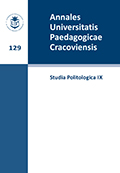Różne barwy przystosowania. Wokół działalności Aleksandra Gieysztora w PRL
Abstract
The article presents the profile of a prominent Polish historian who specialized in the Medieval Age, Prof. Aleksander Gieysztor, and the political conditionings of his professional career in the People’s Poland. Aleksander Gieysztor, a soldier of the September 1939, a member of Home Army in the years 1940-1944 and Freedom and Independence in 1945 was one of the most prominent Polish historians and humanists of the post-war period. Due to his past and his independent attitude he was invigilated by the Ministry of Public Security of Poland in the 1950s and the Security Service in the 1960s and the 1980s. He managed to avoid serious consequences thanks to demonstrating his loyalty to the Communist country as well as his strengthening scholarly position. Numerous contacts of Gieysztor with the abroad, including Polish emigration, became the reason why the intelligence of the Polish People’s Republic, with which he agreed to co-operate in 1963, became interested in his person. During that cooperation he did not communicate information about the particular people staying in Poland. The main reason of Gieysztor’s activity in the People’s Poland was the desire to keep the continuity of the functioning of Polish culture and science. Thinking in categories more longterm than the current politics, he left monuments in the form of institutions that he managed as well as many prominent students. He paid a price of painful compromises that he had to make, balancing on a thin line between opportunism, conformism and acting for the Polish science as well as the national interest.Downloads
Published
2015-08-07
Issue
Section
Scientific paper
License
Redakcja przyjmuje do druku teksty oryginalne, wcześniej niepublikowane. Treść czasopisma jest dostępna na licencji Creative Commons (CC-BY-NC-ND 3.0 PL)
Licencja ta zezwala na wykorzystanie materiałów opublikowanych w czasopiśmie w celach niekomercyjnych np. komentarza, krytyki, informacji, archiwizacji, nauczania lub prowadzenia badań, z poszanowaniem aktualnie obowiązującego prawa autorskiego (ustawa z dnia 4 lutego 1994 r. o prawie autorskim i prawach pokrewnych Dz.U. 1994 nr 24 poz. 83 z poźn. zm.). Zgodnie z wymogami licencji, konieczne jest dokładne podanie źródła cytowania lub parafrazowania oraz zachowanie tekstu w oryginalnej postaci (zakaz tworzenia utworów zależnych).

